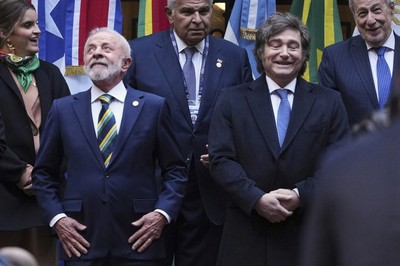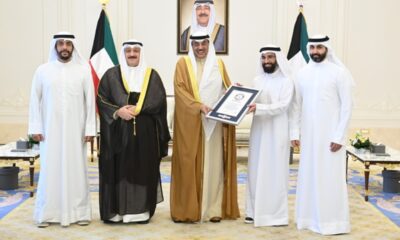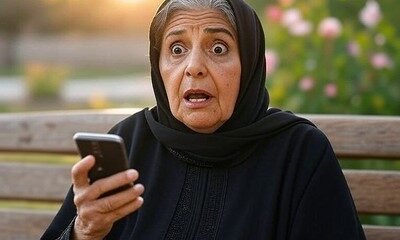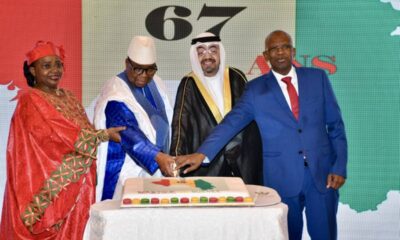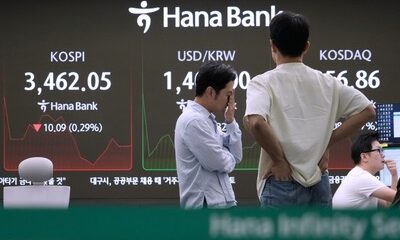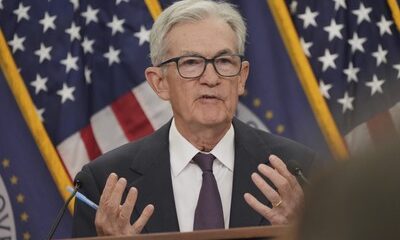Brazil’s President Luiz Inacio Lula da Silva, (front left), and Argentina’s President Javier Milei, stand next to each other as they get into position for a group photo with other leaders attending the Mercosur Summit in Buenos Aires, Argentina on July 3. (AP)
RIO DE JANEIRO, Sept 17, (AP): South America’s Mercosur bloc signed a free trade deal Tuesday with the European countries of Iceland, Liechtenstein, Norway and Switzerland, as ties between the two continents deepen amid global uncertainty sparked by sweeping US tariffs. The agreement was signed in Rio de Janeiro between Argentina, Brazil, Paraguay and Uruguay on one hand, and the four European countries – none of which belong to the European Union – on the other.
The deal will create a free trade zone of almost 300 million people and a combined gross domestic product of more than $4.3 trillion, according to a joint statement. “Even in a world marked by trade tensions and rising protectionism, we remain advocates of international trade based on rules,” Brazil’s Foreign Minister Mauro Vieira said at the ceremony on Tuesday.
The reference to tension and protectionism was aimed at tariffs imposed by US President Donald Trump on a wide range of countries. Trump enforced tariffs of 50% on Brazil in response to, among other issues, the coup trial of former President Jair Bolsonaro, which the US president called a “witch hunt.” Last week, a panel of justices ruled that the ex-leader had attempted a coup and sentenced him to 27 years in prison.
Tuesday’s deal covers goods, services, investment and intellectual property rights, among other areas. It could generate a drop in prices of Swiss chocolate and Norwegian cod in the South American nations, and cheaper beef in the European countries. “Both sides will benefit from improved market access for more than 97% of their exports, which will increase bilateral trade and translate into benefits for businesses and individuals,” the joint statement said.
Each country must ratify the trade deal for it to come into effect. The 14 rounds of negotiations leading up to the deal began in June 2017 in Buenos Aires. The Mercosur bloc also hopes to soon ratify a much larger free trade deal with the European Union. Last December, the two groups of nations agreed to the deal some 25 years after negotiations were launched, but it still needs to be ratified by both sides.
Tuesday’s agreement shows that Mercosur is willing to adapt to EU standards, said Flavia Loss, an international relations professor at Foundation School of Sociology and Politics in Sao Paulo. “It’s an important signal to convince the EU of Mercosur’s goodwill,” she said. Observers say that the EU-Mercosur trade deal increased in importance for Brazil after Trump’s 50% tariff, as it led to an increased push to diversify trading partners.

 Politics23 hours ago
Politics23 hours ago
 Politics13 hours ago
Politics13 hours ago
 Latest News20 hours ago
Latest News20 hours ago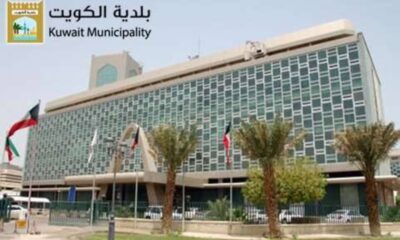
 Latest News23 hours ago
Latest News23 hours ago
 Latest News12 hours ago
Latest News12 hours ago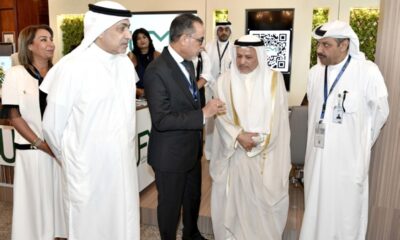
 Latest News22 hours ago
Latest News22 hours ago
 Latest News14 hours ago
Latest News14 hours ago
 Politics3 hours ago
Politics3 hours ago
